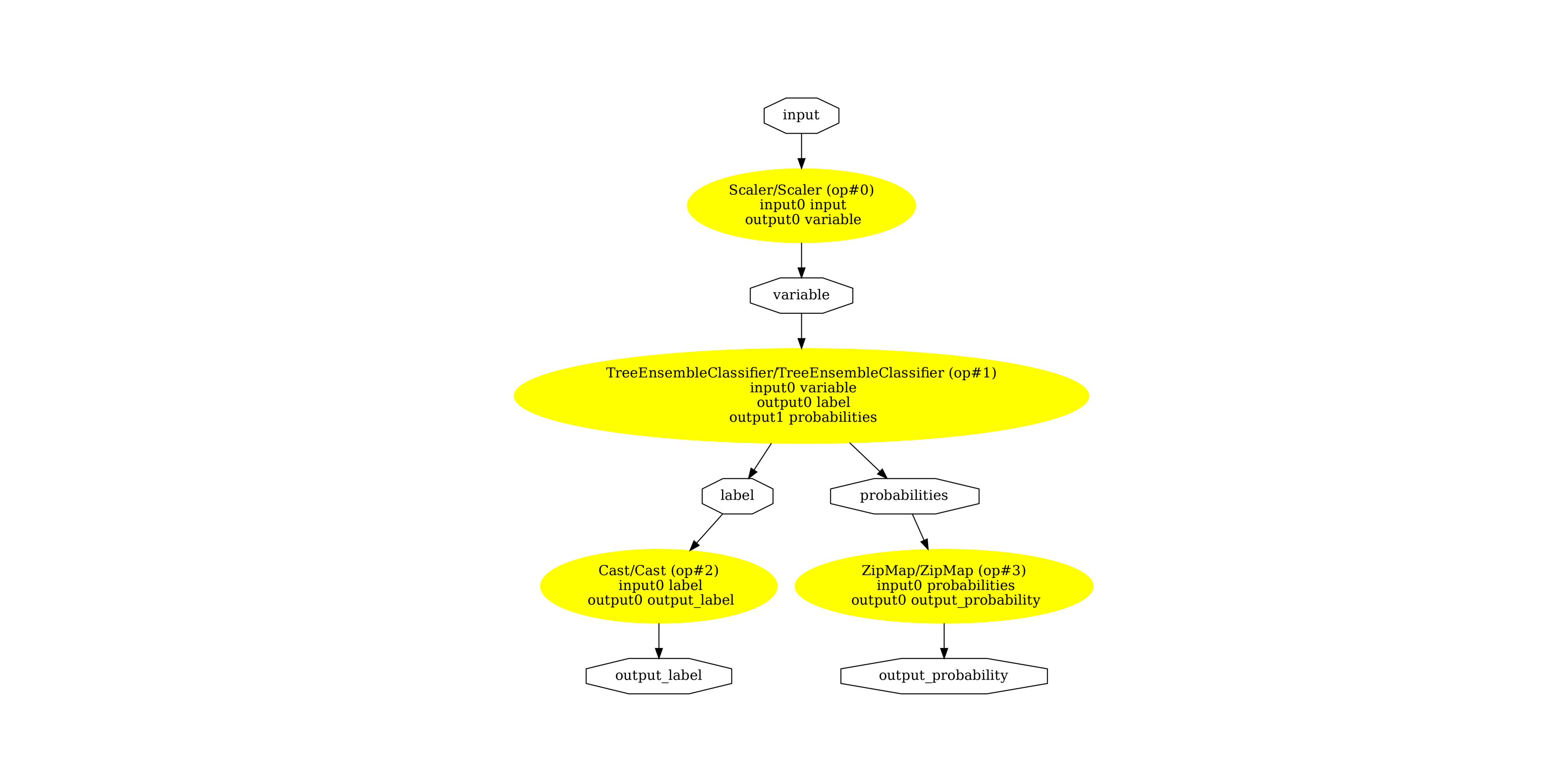Note
Go to the end to download the full example code.
Convert a pipeline with a XGBoost model¶
sklearn-onnx only converts scikit-learn models into ONNX but many libraries implement scikit-learn API so that their models can be included in a scikit-learn pipeline. This example considers a pipeline including a XGBoost model. sklearn-onnx can convert the whole pipeline as long as it knows the converter associated to a XGBClassifier. Let’s see how to do it.
Train a XGBoost classifier¶
import os
import numpy
import matplotlib.pyplot as plt
import onnx
from onnx.tools.net_drawer import GetPydotGraph, GetOpNodeProducer
import onnxruntime as rt
import sklearn
from sklearn.datasets import load_iris
from sklearn.pipeline import Pipeline
from sklearn.preprocessing import StandardScaler
import xgboost
from xgboost import XGBClassifier
import skl2onnx
from skl2onnx.common.data_types import FloatTensorType
from skl2onnx import convert_sklearn, update_registered_converter
from skl2onnx.common.shape_calculator import (
calculate_linear_classifier_output_shapes,
)
import onnxmltools
from onnxmltools.convert.xgboost.operator_converters.XGBoost import (
convert_xgboost,
)
import onnxmltools.convert.common.data_types
data = load_iris()
X = data.data[:, :2]
y = data.target
ind = numpy.arange(X.shape[0])
numpy.random.shuffle(ind)
X = X[ind, :].copy()
y = y[ind].copy()
pipe = Pipeline([("scaler", StandardScaler()), ("lgbm", XGBClassifier(n_estimators=3))])
pipe.fit(X, y)
# The conversion fails but it is expected.
try:
convert_sklearn(
pipe,
"pipeline_xgboost",
[("input", FloatTensorType([None, 2]))],
target_opset={"": 12, "ai.onnx.ml": 2},
)
except Exception as e:
print(e)
# The error message tells no converter was found
# for XGBoost models. By default, *sklearn-onnx*
# only handles models from *scikit-learn* but it can
# be extended to every model following *scikit-learn*
# API as long as the module knows there exists a converter
# for every model used in a pipeline. That's why
# we need to register a converter.
Unable to find a shape calculator for type '<class 'xgboost.sklearn.XGBClassifier'>'.
It usually means the pipeline being converted contains a
transformer or a predictor with no corresponding converter
implemented in sklearn-onnx. If the converted is implemented
in another library, you need to register
the converted so that it can be used by sklearn-onnx (function
update_registered_converter). If the model is not yet covered
by sklearn-onnx, you may raise an issue to
https://github.com/onnx/sklearn-onnx/issues
to get the converter implemented or even contribute to the
project. If the model is a custom model, a new converter must
be implemented. Examples can be found in the gallery.
Register the converter for XGBClassifier¶
The converter is implemented in onnxmltools: onnxmltools…XGBoost.py. and the shape calculator: onnxmltools…Classifier.py.
Then we import the converter and shape calculator.
Let’s register the new converter.
update_registered_converter(
XGBClassifier,
"XGBoostXGBClassifier",
calculate_linear_classifier_output_shapes,
convert_xgboost,
options={"nocl": [True, False], "zipmap": [True, False, "columns"]},
)
Convert again¶
model_onnx = convert_sklearn(
pipe,
"pipeline_xgboost",
[("input", FloatTensorType([None, 2]))],
target_opset={"": 12, "ai.onnx.ml": 2},
)
# And save.
with open("pipeline_xgboost.onnx", "wb") as f:
f.write(model_onnx.SerializeToString())
Compare the predictions¶
Predictions with XGBoost.
print("predict", pipe.predict(X[:5]))
print("predict_proba", pipe.predict_proba(X[:1]))
predict [1 0 2 2 2]
predict_proba [[0.16721195 0.66290665 0.16988143]]
Predictions with onnxruntime.
sess = rt.InferenceSession("pipeline_xgboost.onnx", providers=["CPUExecutionProvider"])
pred_onx = sess.run(None, {"input": X[:5].astype(numpy.float32)})
print("predict", pred_onx[0])
print("predict_proba", pred_onx[1][:1])
predict [1 0 2 2 2]
predict_proba [{0: 0.16721194982528687, 1: 0.6629066467285156, 2: 0.1698814332485199}]
Display the ONNX graph¶
pydot_graph = GetPydotGraph(
model_onnx.graph,
name=model_onnx.graph.name,
rankdir="TB",
node_producer=GetOpNodeProducer(
"docstring", color="yellow", fillcolor="yellow", style="filled"
),
)
pydot_graph.write_dot("pipeline.dot")
os.system("dot -O -Gdpi=300 -Tpng pipeline.dot")
image = plt.imread("pipeline.dot.png")
fig, ax = plt.subplots(figsize=(40, 20))
ax.imshow(image)
ax.axis("off")

(np.float64(-0.5), np.float64(2485.5), np.float64(2558.5), np.float64(-0.5))
Versions used for this example
print("numpy:", numpy.__version__)
print("scikit-learn:", sklearn.__version__)
print("onnx: ", onnx.__version__)
print("onnxruntime: ", rt.__version__)
print("skl2onnx: ", skl2onnx.__version__)
print("onnxmltools: ", onnxmltools.__version__)
print("xgboost: ", xgboost.__version__)
numpy: 2.4.1
scikit-learn: 1.8.0
onnx: 1.21.0
onnxruntime: 1.24.0
skl2onnx: 1.20.0
onnxmltools: 1.16.0
xgboost: 3.1.3
Total running time of the script: (0 minutes 4.411 seconds)